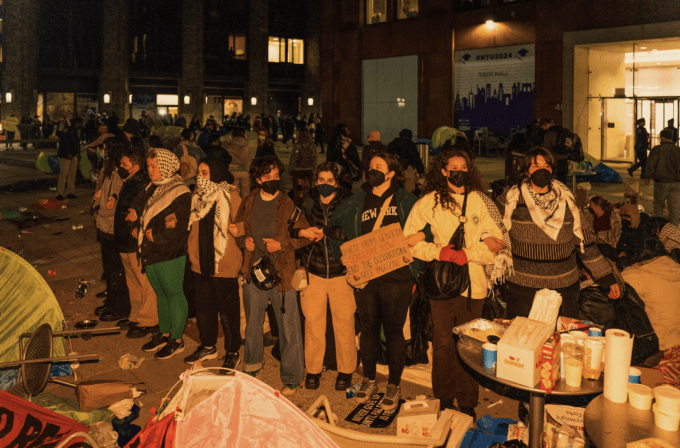
Image by Hany Osman.
“Do you think ‘sit-ins’ at lunch counters, ‘Freedom Buses’ and other demonstrations by Negroes will hurt or help the Negro’s chances of being integrated in the South?” This question was posed by Gallup, a leading polling organization, back in 1961, during the heyday of the Civil Rights Movement. A majority of Americans at the time, 57%, believed that the sit-ins would “hurt” the movement. They were wrong. Today, we credit the Civil Rights Movement with ending racial segregation in the United States, but we cannot disconnect its success from its tactics. Martin Luther King Jr. was no advocate of passive resistance, but a firm believer in “militant nonviolence”– a consistent torrent of protests in the form of boycotts, mass marches, sit-ins, and strikes. These are similar tactics to those that students across the world are using to spread awareness of the over 30,000 Palestinians killed in Gaza and to push their universities to dissociate from the Israeli State. In the same way that perceptions of the Civil Rights Movement were inaccurate, I am afraid that perceptions of the student encampments are becoming warped. There are strong structural and cognitive forces that can explain why public perceptions are so distant from the reality on the ground today. It is important to consider these forces to think clearly about our country’s national reckoning with the war on Gaza.
The way that the media covers protests is a major force driving the mismatch between the perception and reality of student encampments. According to the Armed Conflict Location & Event Data Project, 99% of the student protests since October 2023 have remained peaceful. Despite this, media coverage has disproportionately highlighted exceptions, such as clashes between counter-protesters, police, and student campers at UCLA, which have resulted in hospitalizations of a number of protesters. Decades of media research on social movements have consistently shown a tendency to emphasize the most sensational aspects of protests, such as confrontations with law enforcement or instances of property damage. For instance, one study analyzing articles on the Black Lives Matter protests following the death of Michael Brown revealed a pattern of coverage that focused on disapproval, blame, and criminality towards the movement, neglecting the underlying issues of racial injustice behind its formation. In 2020, Fox News was even found reporting old footage of protester violence at BLM rallies during weeks in which protests were mostly peaceful.
This strategy is effective because it exploits our biases, such as the negativity bias and availability bias. The negativity bias is our tendency to notice, remember, and dwell on negative events more strongly than positive ones. Negativity is an attention magnet, and this is a problem because what we pay attention to is what we remember. Then, the availability bias leads us to make assessments of risk and danger based on our recent or available memory, rather than representative data. At a minimum, these biases amplify the impact of media sensationalism, heightening our fears about student protests, even when empirical evidence suggests otherwise. At its worst, this hyper-focus on the provocative actions of a minority of protesters can contribute to the collective blame of entire movements, as audiences make generalizations about movements based on consistent exposure to such incidents. This is dangerous; research has shown that collective blame can lead to retribution toward individuals belonging to the blamed groups. In fact, at UCSD, my institution there was an uptick in harassment of Muslim students since their encampment.
So what can we do about these biases? Fortunately, psychological research has documented effective strategies to counteract these biases. One approach is inoculation; research has demonstrated that just as individuals can develop immunity to viruses, they can also be psychologically protected against deceptive persuasion techniques. In one study, researchers exposed people to videos demonstrating how media outlets often use emotionally manipulative language to garner views, and rehearsed ways to spot this technique. They found that these videos made people better at discerning untrustworthy news content and improved the quality of news content they intended to share.
Another effective intervention is a collective blame hypocrisy exercise. In two studies, researchers found that asking White individuals to reflect on their own group’s culpability in White supremacist terrorist attacks reduced their tendency to blame individual Muslims and the Muslim community as a whole for Islamist terrorist attacks. Moreover, engagement in this exercise also reduced prejudicial feelings toward Muslims and decreased support for anti-Muslim policies, like the monitoring of all Muslims.
The polarized attitudes toward the student protesters we see today are a product of biases that media outlets capitalize on, which, in effect, disempowers the student movements that are trying to shed light on what is happening in Gaza. Becoming aware of manipulative media tactics and reflecting on whether we are culpable for the actions of other individuals within our groups can help de-bias our perceptions of student protesters. When we see news stories of student protesters, we can ask ourselves two questions: 1) Is this story using emotionally exaggerated language to grab my attention?, and 2) Do the actions this story is reporting on represent the behavior of an entire group? Social movements have been the means through which everyday people put pressure on those in power for societal change. Don’t be fooled into thinking that their primary goals are otherwise.
The post Thinking Clearly About the Protesters appeared first on CounterPunch.org.
This content originally appeared on CounterPunch.org and was authored by Raihan Alam.
Raihan Alam | Radio Free (2024-05-17T06:00:02+00:00) Thinking Clearly About the Protesters. Retrieved from https://www.radiofree.org/2024/05/17/thinking-clearly-about-the-protesters/
Please log in to upload a file.
There are no updates yet.
Click the Upload button above to add an update.